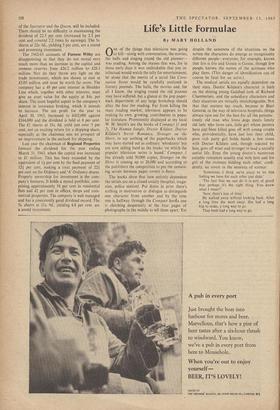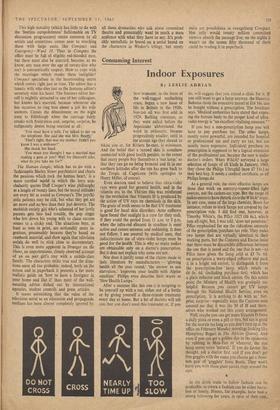Life's Little . Formulae
By MARY HOLLAND
ONE of the things that television was going to kill—along with conversation, the movies, the halls and singing round the old pianner- was reading. Among the masses that was, for in those early days it was unthinkable that any in- tellectual would watch the telly for entertainment, let alone that the merits of a serial like Coro- nation Street would be carefully analysed in literary journals. The halls, the movies and, for all I know, the singing round the old pianner may have suffered, but a glance at the pop paper- back department of any large bookshop•should allay the fear for reading. Far from killing the mass reading market, television appears to be making its own, growing, contribution to popu- lar literature. Prominently displayed at my local W. H. Smith's are the books of Compact (1 and 2), The Human Jungle, Doctor Kildare, Doctor Kildaie's Secret Romance, Stranger on the Shore, to say nothing of the paperbacks which may have started out as ordinary 'whodunits' but are now selling hard as the books 'on which the popular television series is based.' Compact 1 has already sold 50,000 copies, Stranger on the Shore is coming up to 20,000 and according to the publishers the competition to put the remain- ing serials between paper covers is fierce.
The books show first how entirely dependent the serials are on a closed society (hospital, maga- zine, police station). Put down in print there's nothing in motivation or dialogue to distinguish one character from another and by the time one is halfway through the Compact books one is, clutching desperately at the four pages of photographs in the middle to tell them apart. Yet despite the sameness of the situations on the screen the characters do emerge as recognisably different people—everyone, for example, knows that Iris is Iris and Gussie is Gussie, though few people known the names of the actresses who play them. (This danger of identification can of course be fatal for an actor.) The medical serials are equally dependent on their stars. Doctor Kildare's character is built on the shining young Galahad look of Richard Chamberlain, and the subsidiary characters and their situations are virtually interchangeable. Not that that matters top much, because at Blair General, in the way of television hospitals, things always turn out for the best for all the patients: lonely old man who loves dogs meets lonely old lady who loves cats, little girl whose parents have just been killed goes off with young couple who, providentially, have just lost their child, poor rich party girl holds hands a few times with Doctor Kildare and, though rejected by him, goes off wiser and stronger to lead a socially useful life. Even the young doctor's numerous suitable romances usually end with him and his girl of the moment bidding each other, confi- dently, au revoir in the interests of science:
'Sometimes I think we're crazy to let this feeling we have for each other just slide.'
'The fact that we can do it is sort, of proof that perhaps it's the right thing. You know what I mean?'
'Sure, there's lots of time.'
He walked away without looking back. After a long time she went away. She had a long trip to make, a long way to go.
They both had a long way to go.
This high morality (which has little to do with the 'fearless outspokenness' fashionable on TV discussion programmes) seems common to all serials and sometimes comes near to wrecking those with large casts, like Compact and Emergency—Ward 10. Thus in Compact the office must be full of eligible red-blooded men, but these must also be married, because, as we know, any man over the age of twenty-five who isn't is automatically suspect. How to cope with the marriages which render them ineligible? Compact specialises in the heartrending secret which comes right just in time. The editor has a lunatic wife who dies just as the features editor's secretary wins his heart. The features editor her- self is mightily attracted to one of her colleagues, but knows he's married, because whenever she has occasion to ring him about a job his wife answers. Conies the denouement on the night train to Edinburgh when the carriage fairly creaks with frustration and, surprise, surprise, he indignantly denies being married at all: 'You must have a wife. I've talked to her on the telephone. She said she was Mrs. Beatty.'
'That's right, that was my mother. Didn't you know I was a widower?'
She shook her head.
'You mean you thought I was a married man making a pass at you? Well for Heaven's sake, what do you take me for?'
The Human Jungle, which has to do with a 'fashionable Harley Street psychiatrist and charts the passions which rock the human heart,' is a more rarefied world in which the hero non- chalantly quotes Duff Cooper's wine philosophy at a length of twenty lines, but the moral attitudes are every bit as sound as Compact's. The psychi- atric patients may be sick, but what they get are no more and no 'less than their just desserts. The snobbish society girl who's ashamed of her lowly parents gets into bad trouble, the pop singer who lets down his young wife to chase success comes to a sticky end. The situations here, at least as seen in print, are noticeably more in- genious, presumably because they're based on casebook material, and show again that television serials do well to stick close to documentary. This is even more apparent in Stranger on the Shore, an unpretentious, closely observed account of an au pair girl's stay with a middle-class family. The characters strike true and the situa- tions seem all too probable; indeed, both on the screen and in paperback it presents a far more realistic guide on 'how to have a foreigner in your home and like it' than most of the well- meaning advice dished out by international agencies, student councils and press articles.
It seems astonishing that the value of the television serial as an education and propaganda medium has been almost completely ignored by all those dramatists who talk about committed theatre and presumably want to reach a mass audience with what they have to say. It's prob- ably unrealistic to brood on a serial based on the characters in Wesker's trilogy, but surely
theit are possibilities in evangelising Compact. Not Only would twenty million committed viewers absorb the message live; on the nights it wasn't on the screen fifty thousand of them could be reading it in paperback.































 Previous page
Previous page